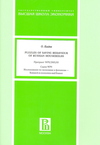Publications in 2010
International Trade and Investment Agreements and Foreign Direct Investment Activities in Developing and Emerging Economies. Evidence from Japanese Multinational Companies
.jpg) |
Author: Betschinger M.-A. Hamburg 2010, 336 Seiten, ISBN 978-3-8300-5110-7 Foreign companies often forego high profile corporate investments in developing markets fearing regulatory opacity, investment barriers, or political instability. Host and investor home governments can develop appropriate strategies to mitigate such risks and attract FDI into these markets. One policy tool available to achieve this goal is bilateral or multi-lateral investment agreements. This study focuses on bilateral investment treaties and preferential trade and investment agreements and explores if and under which conditions these treaties promote different types of foreign direct investment. The empirical evidence involves Japanese multinational firms’ activities abroad. |
Dynamically Optimal Executive Compensation when Reservation Utilities Are History-Dependent
 |
Author: Morfov S. HSE Working Paper Series 9 «Research in economics and finance», no. 2010/03, 51p. This paper computes the optimal executive compensation in an infinite-horizon moral hazard framework characterized by limited commitment and history-dependent reservation utilities. The model is given a recursive form and some properties of the state space are established. I derive a sufficient condition for the optimal contract to provide the CEO with insurance against fluctuations in the value of his/her outside options under short-term history dependence. In the numerical computation of the endogenous state space, I use an innovative algorithm which does not rely on the convexity of the underlying set. Exerting effort appears to be the predominant strategy for the principal, but shirking may still be optimal when the manager is rich enough. The optimal wage scheme and the future utility of the CEO tend to grow in both his/her current utility and in the firm’s future profit. The manager’s utility tends to increase weakly in the long run and appears to have a non-degenerate long-term distribution depending on the initial utility promise but not on the initial history. |
Dynamic Moral Hazard with History-Dependent Participation Constraints
 |
Author: Morfov S. HSE Working Paper Series 9 «Research in economics and finance», no. 2010/02, 41p. This paper considers a moral hazard problem in an infinite-horizon, principal-agent framework. In the model, both the principal and the agent can commit only to short-term (single-period) contracts and their reservation utilities are allowed to depend on some finite truncation of the history of observables. After existence is proved, the original problem of obtaining the optimal incentive- compatible self-enforcing contract is given an equivalent recursive representation on a properly defined state space. I construct an auxiliary version of the problem where the participation of the principal is not guaranteed. The endogenous state space of agent’s expected discounted utilities which on a different dimension includes the set of truncated initial histories in order to account for their influence on the reservation utilities is proven to be the largest fixed point of a set operator. Then, the self-enforcing contract is shown to be recursively obtainable from the solution of the auxiliary problem by severely punishing any violation of the principal’s participation constraint.
|
Transaction costs, liquidity and expected returns at the Berlin Stock Exchange, 1892-1913
.jpg) |
Author: Burhop C., Gelman S. Bonn, Max Planck Institute for Research on Collective Goods, 2010, 23p. We estimate effective spreads and round-trip transaction costs at the Berlin Stock Exchange for the period 1892-1913 using daily stock market returnsfor a sample of 27 stocks. Our results show that transaction costs at the main stock exchange in a bank-based financial system at the turn of the 20th century were quite low and about comparable to transaction costs in modern markets. Nonetheless, transaction costs varied substantially over time andacross securities, whereby the cross-sectional variation could be substantially explained by firm size and time variation by crises. Furthermore, we find surprising evidence that transaction costs decrease the expected excess returns. Thereby size and momentum premia are of expected signs while market beta has no significant influence on the cross-sectional return variation. JEL classification: N23; G12; G14 Key words: Economic history, Germany, Transaction Costs, Effective spreads |
State property in the Russian economy (part 1): the scale and distribution by sectors
 |
Author: Sprenger C. Journal of the New Economic Association (in Russian) 2010. № 6, pp.120—142 |
State property in the Russian economy (part 2): Management problems and impact on the effectiveness
 |
Author: Sprenger C. Journal of the New Economic Association (in Russian) 2010. № 7, pp.90—111 |
Have you spotted a typo?
Highlight it, click Ctrl+Enter and send us a message. Thank you for your help!
To be used only for spelling or punctuation mistakes.